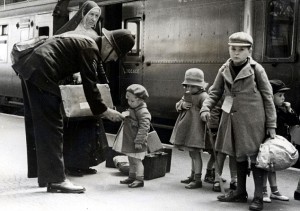 I am in the midst of a long-term project to document instances when empathy has flowered on a mass scale and shifted the course of human history. While empathy has periodically collapsed on a collective scale – just think of colonialism in Latin America or the Holocaust – there have also been moments when it has emerged as a force for positive and radical social change. If we want to tackle today’s global crises – from wealth inequality and armed conflict to climate change and food insecurity – we need to learn from the past and understand how empathy can be harnessed as a powerful tool to shift human behaviour and ignite social action. And one of the most interesting places to look is the evacuation of British children in World War Two. Continue reading
I am in the midst of a long-term project to document instances when empathy has flowered on a mass scale and shifted the course of human history. While empathy has periodically collapsed on a collective scale – just think of colonialism in Latin America or the Holocaust – there have also been moments when it has emerged as a force for positive and radical social change. If we want to tackle today’s global crises – from wealth inequality and armed conflict to climate change and food insecurity – we need to learn from the past and understand how empathy can be harnessed as a powerful tool to shift human behaviour and ignite social action. And one of the most interesting places to look is the evacuation of British children in World War Two. Continue reading
Category: ethics
Why George Orwell is my empathy hero
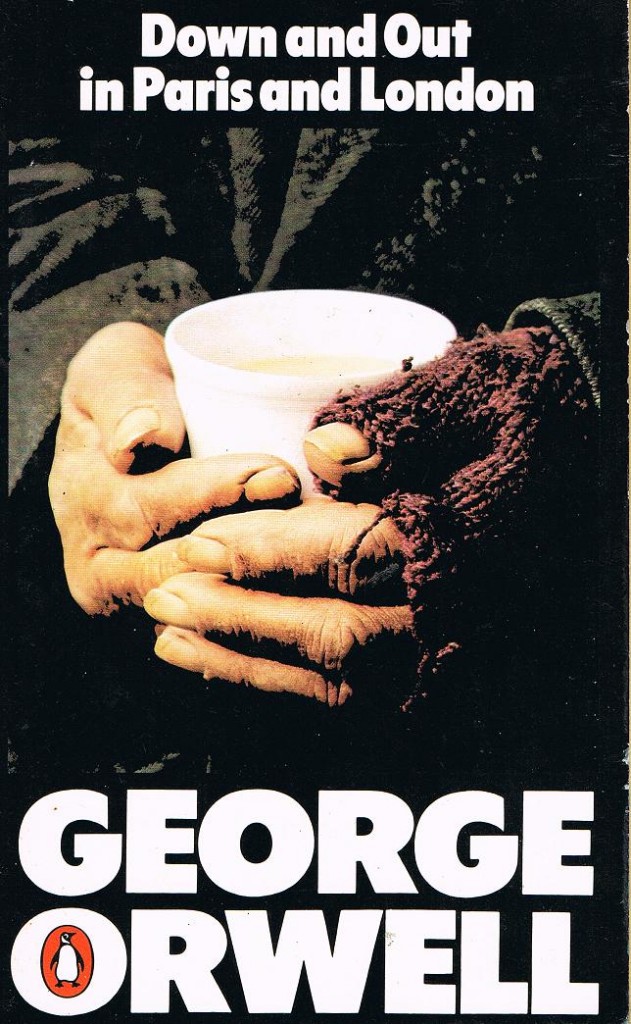 I was recently interviewed by The Browser – a fabulous site which compiles quality writing from around the web – about my five top books on the art of living. In the following extract I discuss George Orwell’s Down and Out in Paris and London, a book which has been a major inspiration for all my work on empathy.
I was recently interviewed by The Browser – a fabulous site which compiles quality writing from around the web – about my five top books on the art of living. In the following extract I discuss George Orwell’s Down and Out in Paris and London, a book which has been a major inspiration for all my work on empathy.
George Orwell’s Down and Out in Paris and London is your second choice. What does it teach us?
I think that Orwell was one of the great travel adventurers of the 20th century. The reason I think that is because in Down and Out in Paris and London he showed that empathy could become an extreme sport and the guideline for the art of living. It’s the second half of the book that I particularly like, in which he describes how he went tramping in east London. He would dress up as a tramp and go into the streets of London, fraternising with beggars and people living on the streets. He was trying to empathise with people who lived on the social margins. Continue reading
The lost history of the househusband
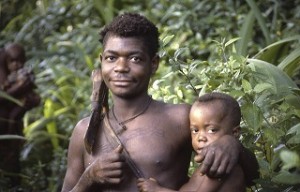 The following article originally appeared in The Guardian.
The following article originally appeared in The Guardian.
The great tragedy of modern parenting is that we’ve forgotten its history – and mothers are paying the price. Contrary to popular belief, the superdad who takes on a serious share of childcare and housework is not a new invention. Before the industrial revolution – a mere couple of hundred years ago – most men were stay-at-home fathers, skilled at comforting wailing babes and bathing squirming toddlers. I didn’t know this four years ago when my partner, Kate, became pregnant with twins. I had never wanted to have children, worrying that it would scupper my hopes of becoming a writer, so I panicked. How was I going to embrace the seismic shock of double-dose fatherhood? Continue reading
Is social media killing the art of conversation?
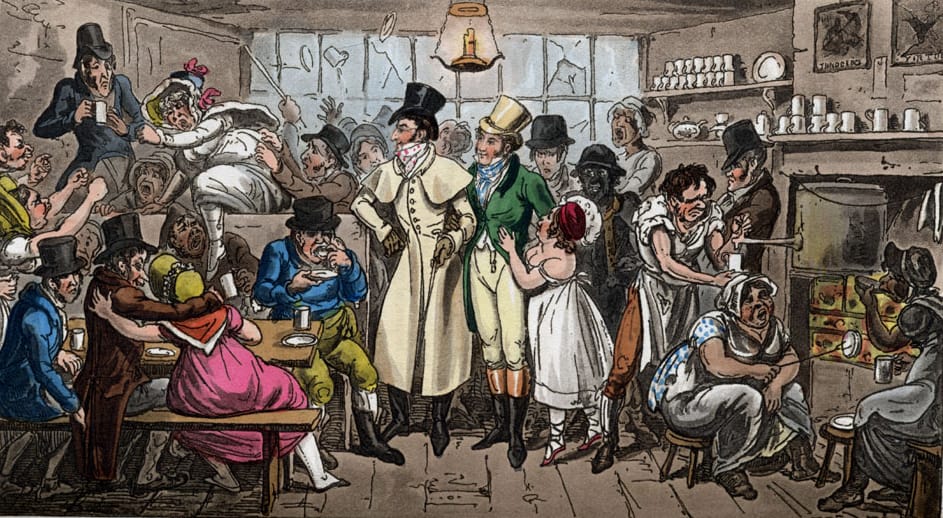 Ready for a digital diet in 2012? In this article just published in the Independent on Sunday – and based on my new book The Wonderbox: Curious Histories of How to Live – I argue why we need less electro-chatter and more thoughtful, face-to-face conversation. (You’ll also find out why Dr Samuel Johnson is the most disastrous conversationalist in British history.)
Ready for a digital diet in 2012? In this article just published in the Independent on Sunday – and based on my new book The Wonderbox: Curious Histories of How to Live – I argue why we need less electro-chatter and more thoughtful, face-to-face conversation. (You’ll also find out why Dr Samuel Johnson is the most disastrous conversationalist in British history.)
There is a crisis in the art of conversation, and it’s making us hungry. On the one hand, we face a famine of quality conversation in our relationships. The typical British couple spends more time watching television together – on average, 55 minutes a day – than talking to each other. And the most common reason given for divorce in the West is wives complaining that their husbands don’t speak or listen to them.
On the other hand, thanks to technology, we are awash with superficial talk. Think of all the staccato texts and Facebook posts sent last year – how many of those words really added depth and meaning to our lives? We’re stuffing ourselves with chatter, but ending up starved of the quality conversation that Socrates savoured.
So should 2012 be the year to put ourselves on a digital diet, as several self-help gurus have suggested? Is it time to worry less about inches on our waistline and more about our hours online?
Read the full article here.
New Book! THE WONDERBOX by Roman Krznaric
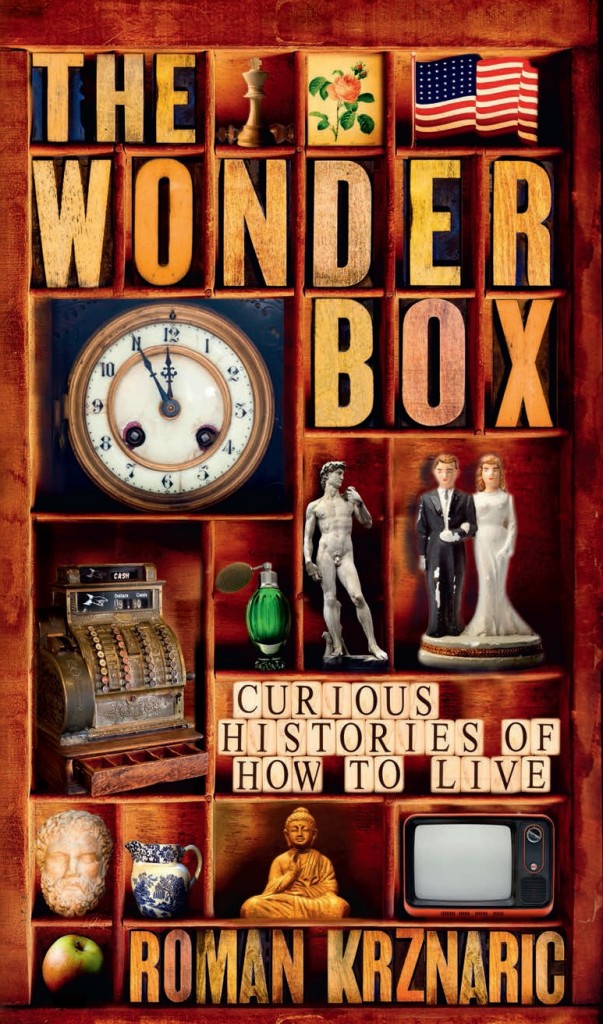 My new book, THE WONDERBOX: CURIOUS HISTORIES OF HOW TO LIVE (Profile Books), will be in bookshops from December 22 – just in time for a last-minute Christmas stocking filler.
My new book, THE WONDERBOX: CURIOUS HISTORIES OF HOW TO LIVE (Profile Books), will be in bookshops from December 22 – just in time for a last-minute Christmas stocking filler.
It’s about what the last three thousand years of human history can tell us about better living, and explores twelve universal topics, from work and love to money, creativity and empathy. What might we learn from the Ancient Greeks about the different varieties of love, from the industrial revolution about changing career, or from ancient Japanese pilgrims on the art of travel?
‘The Wonderbox is a cornucopia of delights. Completely fascinating, beautifully written and brimming with insights that challenge our entrenched and predictable ways of seeing and doing, it draws on an amazing range of stories from the history of human culture to explain how we can find true meaning in life. Every thinking home should have one!’ – Michael Wood, historian, broadcaster and author of The Story of England
Find out more about the book here. You can buy it from Amazon here.
The book is being launched with a series of five talks at The School of Life, Life Lessons from The Wonderbox, starting January 11 with ‘The Six Varieties of Love’.
Best wishes and happy reading!
Roman
The radical origins of compassion
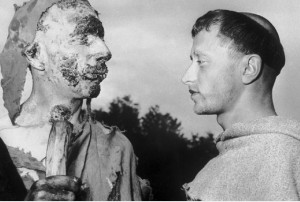 So you think compassion means being nice to people? Sure, its Latin root literally means ‘to suffer with another’, which is pretty close to the psychological concept of ‘affective empathy’, where you share in or mirror someone else’s emotional state. When I feel your pain or suffering, I may well do something to help you out.
So you think compassion means being nice to people? Sure, its Latin root literally means ‘to suffer with another’, which is pretty close to the psychological concept of ‘affective empathy’, where you share in or mirror someone else’s emotional state. When I feel your pain or suffering, I may well do something to help you out.
But there’s much more to compassion than that. It’s time we recognised it as a source of radical social change which can erode prejudice, create human bonds across social divides, and spur political action. A flowering of compassion was at the roots of the anti-slavery movement in the eighteenth century, the creation of organisations to tackle child poverty in the nineteenth, and countless other political initiatives. ‘So often when people hear about suffering in our world they feel guilty,’ says Desmond Tutu, ‘but rarely does guilt actually motivate action like empathy or compassion.’ Continue reading
To smack or not to smack? An interview with Christopher Wakling
 Christopher Wakling’s new novel, What I Did, is a brilliant, dark and often excruciatingly funny journey into a family nightmare. Narrated by a six-year-old boy obsessed with the animal kingdom, it has been the recipient of scintillating reviews, was nominated for the Booker Prize and is fast becoming a book club favourite. I talked to the author – who is also a respected teacher of creative writing – about what it takes to write through a child’s eyes, and what can happen to you when you do. Continue reading
Christopher Wakling’s new novel, What I Did, is a brilliant, dark and often excruciatingly funny journey into a family nightmare. Narrated by a six-year-old boy obsessed with the animal kingdom, it has been the recipient of scintillating reviews, was nominated for the Booker Prize and is fast becoming a book club favourite. I talked to the author – who is also a respected teacher of creative writing – about what it takes to write through a child’s eyes, and what can happen to you when you do. Continue reading
How to be a Muslim, a Hindu, a Christian and a Jew
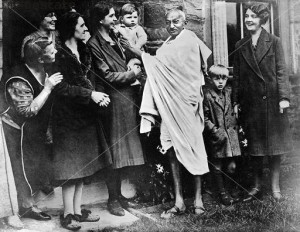 There is an intriguing thesis at the heart of Steven Pinker’s new book, The Better Angels of Our Nature. The Harvard psychologist argues – contrary to popular opinion – that humankind has become progressively less violent over the past few thousand years. We might feel surrounded by terrorism, civil wars and gun crime today, but murder and warfare is in fact on the decline. And the reason? One of Pinker’s key explanations is the rise of empathy as a force for social change: we are now more likely to look at the world through other people’s eyes, and consequently take action on their behalves. Continue reading
There is an intriguing thesis at the heart of Steven Pinker’s new book, The Better Angels of Our Nature. The Harvard psychologist argues – contrary to popular opinion – that humankind has become progressively less violent over the past few thousand years. We might feel surrounded by terrorism, civil wars and gun crime today, but murder and warfare is in fact on the decline. And the reason? One of Pinker’s key explanations is the rise of empathy as a force for social change: we are now more likely to look at the world through other people’s eyes, and consequently take action on their behalves. Continue reading
Dissecting the empathic brain: An interview with Christian Keysers
 Why do we shudder when we watch a tarantula crawling across James Bond’s chest in a 007 movie? And what can looking into a monkey’s brain tell us about our capacity to share in the emotional experiences of other people? Answers to these questions appear in The Empathic Brain: How the Discovery of Mirror Neurons Changes our Understanding of Human Nature, the fascinating and entertaining new book by Christian Keysers, Professor for the Social Brain at the University Groningen in the Netherlands. Keysers, one of the world’s most distinguished and innovative neuroscientists, was part of the famous team at the University of Parma, Italy, that discovered auditory mirror neurons in the macaque monkey, which has revolutionised thinking about how empathy works in human beings. In this exclusive interview for Outrospection, I talk to him about his book, and how far neuroscience has really taken us in our understanding of empathy. Continue reading
Why do we shudder when we watch a tarantula crawling across James Bond’s chest in a 007 movie? And what can looking into a monkey’s brain tell us about our capacity to share in the emotional experiences of other people? Answers to these questions appear in The Empathic Brain: How the Discovery of Mirror Neurons Changes our Understanding of Human Nature, the fascinating and entertaining new book by Christian Keysers, Professor for the Social Brain at the University Groningen in the Netherlands. Keysers, one of the world’s most distinguished and innovative neuroscientists, was part of the famous team at the University of Parma, Italy, that discovered auditory mirror neurons in the macaque monkey, which has revolutionised thinking about how empathy works in human beings. In this exclusive interview for Outrospection, I talk to him about his book, and how far neuroscience has really taken us in our understanding of empathy. Continue reading
Empathy with the enemy
 In the spring of 472 BC the people of Athens queued up to see the latest play written by Aeschylus, the founder of Greek tragedy. The Persians was an unusual production, and not only because it was based on an historical event rather than the usual legends of the gods. What must have really shocked the audience was that it was told through the eyes of their sworn enemy, the Persians, who only eight years earlier had fought the Athenians at the Battle of Salamis. Continue reading
In the spring of 472 BC the people of Athens queued up to see the latest play written by Aeschylus, the founder of Greek tragedy. The Persians was an unusual production, and not only because it was based on an historical event rather than the usual legends of the gods. What must have really shocked the audience was that it was told through the eyes of their sworn enemy, the Persians, who only eight years earlier had fought the Athenians at the Battle of Salamis. Continue reading